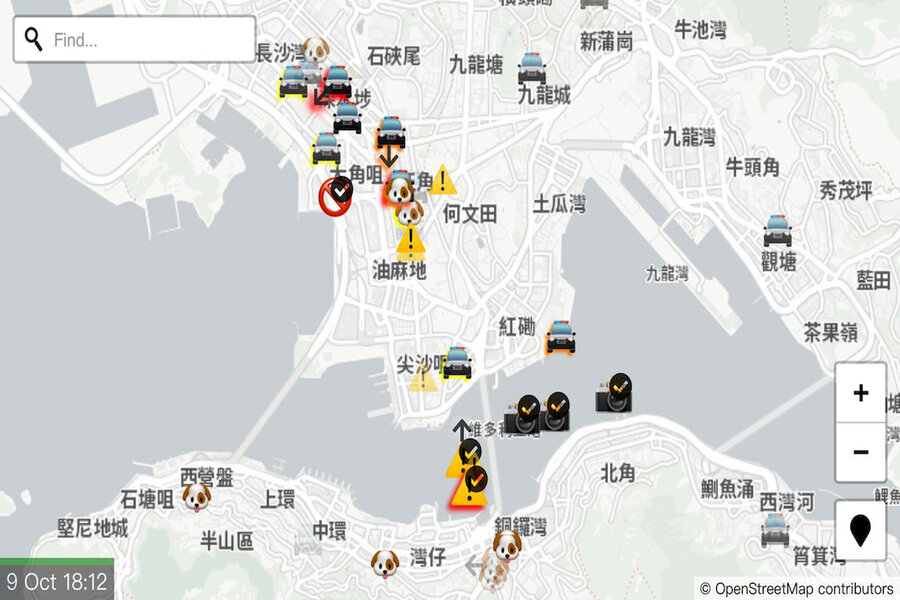Apple removes Hong Kong police tracker app, stirs protests
Loading...
| Hong Kong and Beijing
For people in Hong Kong angry over tactics used by the police to break up anti-government protests, the HKmap.live app was a handy little tool.
With real-time updates showing police movements, it helps steer users away from possible baton charges, volleys of tear gas, and police ID checks.
For Apple Inc., that proved to be a problem.
Under pressure from Beijing, Apple removed the smartphone app from its online store Thursday.
In doing so, it immediately alienated some customers in Hong Kong, even those who haven't been yelling in fury on the streets these past four months.
The company said in a statement that it removed HKmap.live from its app store because it "has been used to target and ambush police" and "threaten public safety."
"Criminals have used it to victimize residents in areas where they know there is no law enforcement," Apple said. "This app violates our guidelines and local laws, and we have removed it from the App Store."
Apple phone user Canny Ng has taken to wearing black to express sympathy for the protesters, though with a 6-month-old baby at home, she's followed the demonstrations on TV, not in the streets.
Apple's decision was "not acceptable," she said, adding she'll think twice about buying more of the company's products.
HKmap.live is "quite useful," she said. "I just want to find a way that I won't see any police, especially when I'm wearing black. You're worried that, oh, maybe they will check your ID," she said.
The existence of such an app shows "most of the Hong Kong people, maybe they're really afraid of the police nowadays," she said.
While no longer available for download, the app still works for users who had already downloaded it to their Apple devices. It also works on Android devices and in web browsers.
As of Thursday evening, it was still posting locations of police patrols and activities.
Apple acted under pressure from various channels, including the Communist Party newspaper People's Daily.
"Is Apple guiding Hong Kong thugs?" it asked.
Hong Kong office worker Acko Wong scoffed at the suggestion that the app helped give a free rein to criminals.
He said the argument that the app could be used to ambush police and point criminals to areas where police aren't stationed "does not make sense."
"How do you ambush a group of police with equipment and gear like helmets and shields?" he asked.
Mr. Wong said he downloaded the app to steer clear of "danger and traffic" during the many battles between protesters and police that have put Hong Kong on edge and prompted a government ban, enforceable by a yearlong prison sentence, on the face masks that many protesters wear to shield their identity.
"If you know there are many police in that area, I'm afraid they will arrest me for like wearing a mask or dressing in black or even if I'm young," he told AP.
A Twitter account linked to the app posted a statement denying it endangered police or Hong Kong residents. It said the app collects information from its users and public sources and doesn't "solicit, promote or encourage criminal activity."
The AP was unable to confirm whether the statement was posted by the app's developers.
The app is one of many tactics used by Hong Kong residents to stay informed about the location of police patrols and document police activities. Widely decried as heavy-handed, the handling of the protests has collapsed public support for what long was considered one of Asia's best police forces.
Users also use the encrypted messaging app Telegram, to post locations and photos of police.
The protests were triggered by a now-abandoned government plan to allow criminal suspects to be extradited for trial in Communist Party-controlled courts in mainland China. It has snowballed into a broader battle to stem the erosion of the Western-style civil liberties and autonomy promised to the former British colony when it returned to China in 1997.
The crisis is putting pressure on those doing business with China to take sides.
Beijing's criticism of Apple followed government attacks last weekend on the National Basketball Association over a comment by the general manager of the Houston Rockets in support of the protesters. China's state TV has canceled broadcasts of NBA games.
People's Daily warned Apple's reputation with Chinese consumers might suffer.
"Apple needs to think deeply," the newspaper said.
Brands targeted in the past by Beijing have been subjected to campaigns by the entirely state-controlled press to drive away consumers or to disruptive investigations by tax authorities and other regulators.
China is vital for Apple's business.
It's Apple's second-biggest market after the United States and CEO Tim Cook says it eventually will become No. 1.
Apple, headquartered in Cupertino, California, also is an important asset for China.
Most of its iPhones and tablet computers are assembled in Chinese factories that employ hundreds of thousands of people. Chinese vendors supply components for Mac Pro computers that are assembled in Texas.
This story was reported by The Associated Press.







